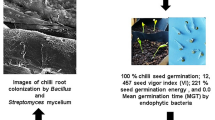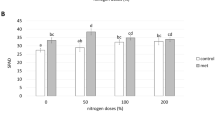Abstract
Microbial inoculants are suitable cost-effective technology to help plants endure drought. For the development of commercial inoculants, screening of efficient plant growth-promoting bacteria (PGPB) is a crucial step. The aim of this study was to evaluate the performance of PGPB to modulate drought resistance in Sorghum bicolor. A pot experiment with sorghum was conducted to access the role of previously selected PGPB strains. In addition, two non-inoculated control treatments (with and without urea fertilization) were also evaluated. For comparison, a fully irrigated treatment (FIT) was also assessed. All plants were fully irrigated for 47 days when the water supply was completely suspended for the drought-stressed treatments. When the soil moisture was close to zero, the irrigation was resumed. During dehydration and rehydration process, the leaf gas exchange (LGE) was evaluated. The parameters of plant growth and nitrogen nutrition were assessed 8 days after reirrigation. Comparing to the FIT, all treatments reduced the LGE rates, but in the presence of Bacillus sp. ESA 402 photosynthesis rate was less reduced. Some inoculation treatments promoted better recovery of photosynthesis, comparable to the FIT, 6 days after rehydration. The plant growth and nitrogen nutrition were negatively affected by the drought, but the inoculation of different bacteria reduced some negative effects. The nitrogen accumulation in the shoots was increased by all strains, suggesting their diazotrophic ability even under drought. Overall, the inoculation of Bacillus sp. ESA 402 was the best bacterium with potential for future field trials.

Similar content being viewed by others
References
Aidar ST, Chaves ARM, Fernandes Júnior PI et al (2017) Vegetative desiccation tolerance of Tripogon spicatus (Poaceae) from the tropical semiarid region of northeastern Brazil. Funct Plant Biol. https://doi.org/10.1071/FP17066
Antunes GR, Santana SRA, Escobar IEC et al (2019) Associative diazotrophic bacteria from forage grasses in the Brazilian semiarid region are effective plant growth promoters. Crop Pasture Sci 70:899–907. https://doi.org/10.1071/CP19076
Alves GC, Videira SS, Urquiaga S, Reis VM (2014) Differential plant growth promotion and nitrogen fixation in two genotypes of maize by several Herbaspirillum inoculants. Plant Soil 387:307–321. https://doi.org/10.1007/s11104-014-2295-2
Baldani JI, Baldani VLD, Seldin D (1986) Characterization of Herbaspirillurn seropedicae gen. nov. sp. nov. a root-associated nitrogen-fixing bacterium. Int J Syst Bacteriol 36:86–93
Baldani D, Baldani JI, Döberenier J (2000) Inoculation of rice plants with the endophytic diazotrophs Herbaspirillum seropedicae and Burkholderia spp. Biol Fertil Soils 30:485–491
Barbosa DD, Brito SL, Fernandes PD et al (2018) Can Bradyrhizobium strains inoculation reduce water deficit effects on peanuts? World J Microbiol Biotechnol 34:87. https://doi.org/10.1007/s11274-018-2474-z
Baruch Z (1994) Responses to drought and flooding in tropical forage grasses. Plant Soil 164:87–96
Baumhardt RL, Tolk JA, Howell TA, Rosenthal WD (2007) Sorghum management practices suited to varying irrigation strategies. Agron J 99:665–672. https://doi.org/10.2134/agronj2006.0092
Brito SL, Santos AB, Barbosa DD, Fernandes PD, Fernandes-Júnior PI, Lima LM (2019) Bradyrhizobium spp. as attenuators of water deficit stress in runner peanut genotypes based on physiological and gene expression responses. Gene Molec Res 18(4):1837. https://doi.org/10.4238/gmr18379
Bulegon LG, Guimarães VF, Laureth JCU (2016) Azospirillum brasilense affects the antioxidant activity and leaf pigment content of Urochloa ruziziensis under water stress. Pesqui Agropecuária Trop 46:343–349. https://doi.org/10.1590/1983-40632016v4641489
da Silva TR, Cazetta JO, Carlin SD, Telles BR (2017) Drought-induced alterations in the uptake of nitrogen, phosphorus and potassium, and the relation with drought tolerance in sugar cane. Ciência e Agrotecnologia 41:117–127. https://doi.org/10.1590/1413-70542017412029416
da Silva JF, da Silva TR, Escobar IEC et al (2018) Screening of plant growth promotion ability among bacteria isolated from field-grown sorghum under different managements in Brazilian drylands. World J Microbiol Biotechnol 34:186. https://doi.org/10.1007/s11274-018-2568-7
Doreau M, Corson MS, Wiedemann SG (2012) Water use by livestock: A global perspective for a regional issue? Anim Front 2:9–16. https://doi.org/10.2527/af.2012-0036
dos Santos CLR, Alves GC, Macedo AVM et al (2017) Contribution of a mixed inoculant containing strains of Burkholderia spp. and Herbaspirillum ssp. to the growth of three sorghum genotypes under increased nitrogen fertilization levels. Appl Soil Ecol 113:96–106. https://doi.org/10.1016/J.APSOIL.2017.02.008
Embrapa (1997) Manual de métodos de análise de solo, 2nd edn. Embrapa Solos, Rio de Janeiro
Fernandes-Júnior PI, de Aidar ST, Morgante CV et al (2015) The resurrection plant Tripogon spicatus (Poaceae) harbors a diversity of plant growth promoting bacteria in northeastern Brazilian Caatinga. Rev Bras Cienc do Solo 39:993–1002. https://doi.org/10.1590/01000683rbcs20140646
Ferreira DF (2011) Sisvar: a computer statistical analysis system. Cienc e Agrotecnologia 35:1039–1042
Figueiredo MVB, Burity HA, Martínez CR, Chanway CP (2008) Alleviation of drought stress in the common bean (Phaseolus vulgaris L.) by co-inoculation with Paenibacillus polymyxa and Rhizobium tropici. Appl Soil Ecol 40:182–188. https://doi.org/10.1016/j.apsoil.2008.04.005
Fretes CE, Suryani R, Purwestri YA, Nuringtyas TR (2018) Diversity of endophytic bacteria in sweet sorghum (Sorghum bicolor (L) Moench) and their potential for promoting plant growth. Indian J Sci Technol 11:1–10. https://doi.org/10.17485/ijst/2018/v11i11/120283
Fukami J, de la Osa C, Ollero FJ et al (2018) Co-inoculation of maize with Azospirillum brasilense and Rhizobium tropici as a strategy to mitigate salinity stress. Funct Plant Biol 45:328–339
Grover M, Ali SZ, Sandhya V et al (2011) Role of microorganisms in adaptation of agriculture crops to abiotic stresses. World J Microbiol Biotechnol 27:1231–1240. https://doi.org/10.1007/s11274-010-0572-7
Hammer Ø, Harper DAT, Ryan PD et al (2011) PaSt: paleontological statistics software package for education and data analysis. Palaentologia Electron 4:5–7. https://doi.org/10.1016/j.bcp.2008.05.025
Hungria M, Campo RJ, Souza EM, Pedrosa FO (2010) Inoculation with selected strains of Azospirillum brasilense and A. lipoferum improves yields of maize and wheat in Brazil. Plant Soil 331:413–425. https://doi.org/10.1007/s11104-009-0262-0
Hungria M, Nogueira MA, Araujo RS (2016) Inoculation of Brachiaria spp. with the plant growth-promoting bacterium Azospirillum brasilense: an environment-friendly component in the reclamation of degraded pastures in the tropics. Agric Ecosyst Environ 221:125–131. https://doi.org/10.1016/j.agee.2016.01.024
Kavamura VN, Santos SN, da Silva JL et al (2013) Screening of Brazilian cacti rhizobacteria for plant growth promotion under drought. Microbiol Res. https://doi.org/10.1016/j.micres.2012.12.002
Larcher W (2003) Physiological plant ecology: ecophysiology and stress physiology of functional groups. Springer Science & Business Media, New York
Leite C, dos Santos JGD, Silva EL et al (2019a) Productivity increase, reduction of nitrogen fertiliser use and drought-stress mitigation by inoculation of Marandu grass (Urochloa brizantha) with Azospirillum brasilense. Crop Pasture Sci 70:61–67
Leite C, dos Santos AC, dos Santos JGD et al (2019b) Mitigation of Mombasa Grass (Megathyrsus maximus) Dependence on Nitrogen Fertilization as a Function of Inoculation with Azospirillum brasilense. Rev Bras Ciência do Solo 43:1–14. https://doi.org/10.1590/18069657rbcs20180234
Liao CFH (1981) Devarda’s alloy method for total nitrogen determination. Soil Sci Soc Am J 45:852–855. https://doi.org/10.2136/sssaj1981.03615995004500050005x
Lima JVL, Weber OB, Correia D et al (2015) Endophytic bacteria in cacti native to a Brazilian semi-arid region. Plant Soil 389:25–33. https://doi.org/10.1007/s11104-014-2344-x
Mareque C, Taulé C, Beracochea M, Battistoni F (2015) Isolation, characterization and plant growth promotion effects of putative bacterial endophytes associated with sweet sorghum (Sorghum bicolor (L) Moench). Ann Microbiol 65:1057–1067. https://doi.org/10.1007/s13213-014-0951-7
Massacci A, Battistelli A, Loreto F (1996) Effect of drought stress on photosynthetic characteristics, growth and sugar accumulation of field-grown sweet sorghum. Aust J Plant Physiol 23:331–340. https://doi.org/10.1071/PP9960331
Molina-Romero D, Baez A, Quintero-Hernández V et al (2017) Compatible bacterial mixture, tolerant to desiccation, improves maize plant growth. PLoS ONE 12:1–21. https://doi.org/10.1371/journal.pone.0187913
Moreira JN, de Lira M, dos Santos MVF et al (2006) Caracterização da vegetação de Caatinga e da dieta de novilhos no Sertão de Pernambuco. Pesqui Agropecuária Bras 41:1643–1651. https://doi.org/10.1590/S0100-204X2006001100011
Naveed M, Hussain MB, Zahir ZA et al (2014) Drought stress amelioration in wheat through inoculation with Burkholderia phytofirmans strain PsJN. Plant Growth Regul 73:121–131. https://doi.org/10.1007/s10725-013-9874-8
Naylor D, Coleman-Derr D (2018) Drought stress and root-associated bacterial communities. Front Plant Sci 8:2223. https://doi.org/10.3389/fpls.2017.02223
Ngumbi E, Kloepper J (2016) Bacterial-mediated drought tolerance: current and future prospects. Appl Soil Ecol 105:109–125. https://doi.org/10.1016/j.apsoil.2016.04.009
Nielsen DC, Halvorson AD (1991) Nitrogen fertility influence on water stress and yield of winter wheat. Agron J 83:1065–1070. https://doi.org/10.2134/agronj1991.00021962008300060025x
Rodrigues Neto J, Malavolta VA Jr, Victor O (1986) Meio simples para o isolamento e cultivo de Xanthomonas campestris pv citri tipo B. Summa Phytopathol 12:32
Sandhya V, Ali SZ, Grover M et al (2010) Effect of plant growth promoting Pseudomonas spp. on compatible solutes, antioxidant status and plant growth of maize under drought stress. Plant Growth Regul 62:21–30. https://doi.org/10.1007/s10725-010-9479-4
Schittenhelm S, Schroetter S (2014) Comparison of drought tolerance of maize, sweet sorghum and sorghum-sudangrass hybrids. J Agron Crop Sci 200:46–53. https://doi.org/10.1111/jac.12039
Schlemper TR, Dimitrov MR, Silva Gutierrez FAO et al (2018) Effect of Burkholderia tropica and Herbaspirillum frisingense strains on sorghum growth is plant genotype dependent. PeerJ 6:e5346. https://doi.org/10.7717/peerj.5346
Shameer S, Prasad TNVKV (2018) Plant growth promoting rhizobacteria for sustainable agricultural practices with special reference to biotic and abiotic stresses. Plant Growth Regul 84:603–615. https://doi.org/10.1007/s10725-017-0365-1
Timmusk S, Abd El-Daim IA, Copolovici L et al (2014) Drought-tolerance of wheat improved by rhizosphere bacteria from harsh environments: enhanced biomass production and reduced emissions of stress volatiles. PLoS ONE. https://doi.org/10.1371/journal.pone.0096086
Voltolini TV (ed) (2011) Produção de caprinos e ovinos no Semiárido, 1st edn. Embrapa Semiárido, Petrolina
Acknowledgements
This study was supported by Brazilian Council for Scientific and Technological Development (CNPq 485168/2013-8), by INCT—Plant Growth-Promoting Microorganisms for Agricultural Sustainability and Environmental Responsibility (INCT-MPCPAgro 465133/2014-4) and the Brazilian Agricultural Research Corporation (Embrapa 23.13.08.003.00.00 and 20.18.03.066.00.00). This study also was funded by the Coordination of Improvement of Higher Education Personnel (CAPES) for providing the scholarship for the first, third and fourth authors. The seventh and last authors are research fellows of CNPq.
Author information
Authors and Affiliations
Corresponding author
Ethics declarations
Conflict of interest
The authors declare that they have no conflict of interest. The funding agencies had no influence on the data acquisition and its analyses. All authors approved the latest version of this manuscript.
Additional information
Communicated by Erko Stackebrandt.
Publisher's Note
Springer Nature remains neutral with regard to jurisdictional claims in published maps and institutional affiliations.
Rights and permissions
About this article
Cite this article
Santana, S.R.A., Voltolini, T.V., Antunes, G.R. et al. Inoculation of plant growth-promoting bacteria attenuates the negative effects of drought on sorghum. Arch Microbiol 202, 1015–1024 (2020). https://doi.org/10.1007/s00203-020-01810-5
Received:
Revised:
Accepted:
Published:
Issue Date:
DOI: https://doi.org/10.1007/s00203-020-01810-5




